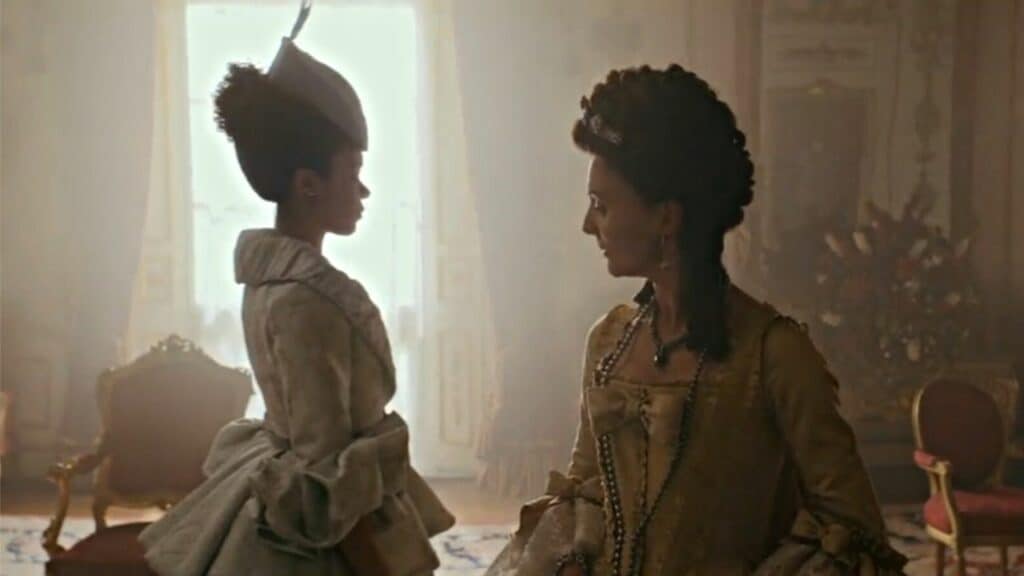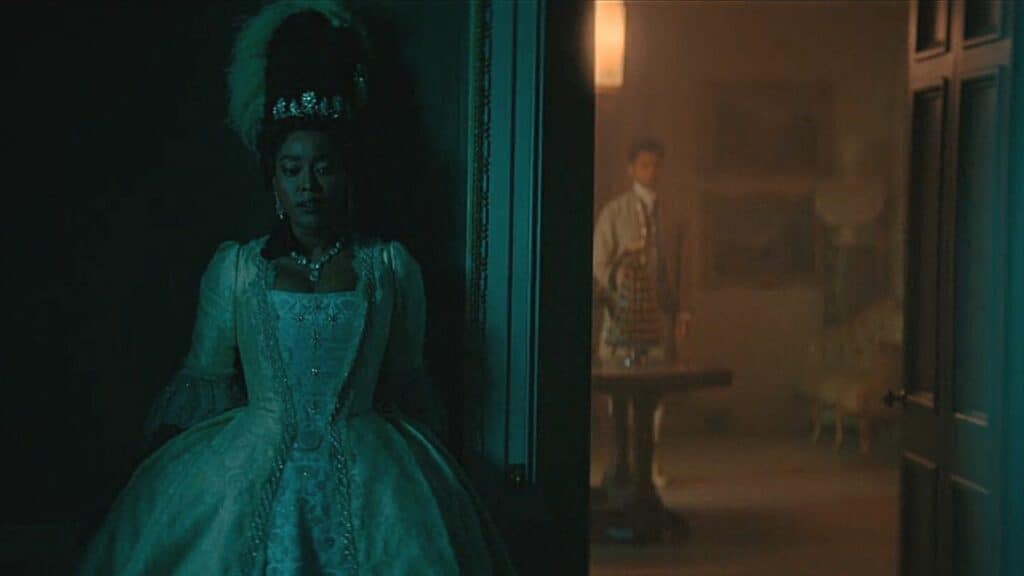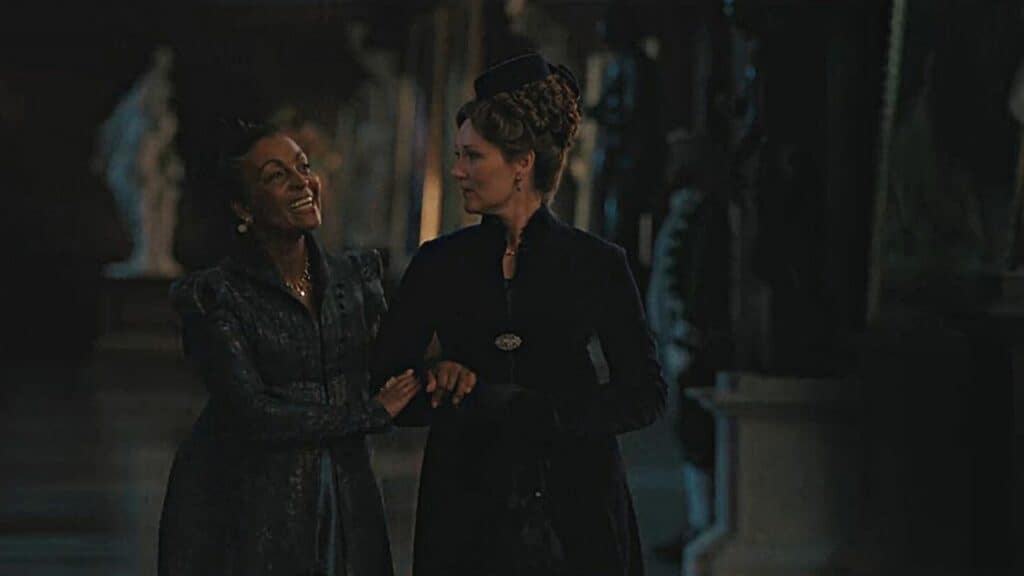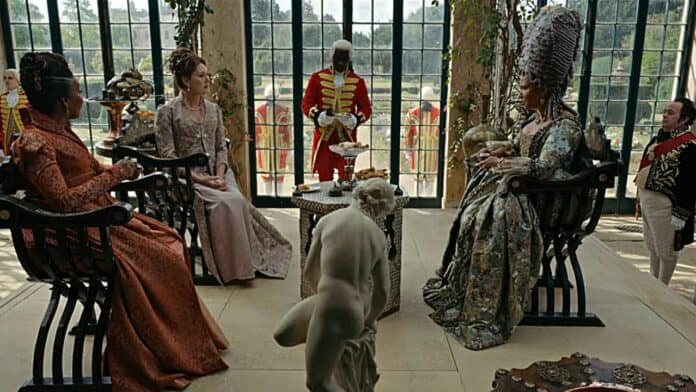Queen Charlotte: A Bridgerton Story follows a newly married Queen Charlotte, who goes on to become a powerful ruler despite the trials and tribulations that stand in her path after her marriage.
Queen Charlotte: A Bridgerton Story is a spin-off series of the popular Bridgerton series. While Charlotte and George’s love story is the main focus of the show, it also gives adequate attention to the stories of women like Lady Danbury and Violet, who are important characters in Bridgerton but not the protagonists.
The show raises important questions in terms of women’s autonomy, identity, and sexuality. Although the women whose stories are told in the show belong to the same class, their experiences are still very different from each other.
For instance, Charlotte, Agatha, and Violet’s opinions on marriage differ because of their personal experiences. Violet sees marriage as a pleasure, while for Agatha, it is a painful lifelong sentence. For Charlotte, whose marriage has been full of love and loss, it can be a bit of both.
A forever-frozen queen
When Charlotte speaks for the first time in the show, it is to express her annoyance at the painful and suffocating clothes and accessories that women must wear to make their bodies look appealing. It is women’s bodies that are given the utmost importance, as their principal duty is to bear children, not to cultivate their minds.
When she is taken to meet Princess Augusta, she is checked for flaws like a piece on display. It can be said that she is indeed a showpiece, as like so many other women, she is not given a choice before she is passed from one man to another in the name of marriage.

The show also takes into consideration a subject that is not as widely discussed; the state of upper-class women in a feudal society, who did not have much to do except attend social events.
During Charlotte’s honeymoon, she is not allowed to leave Buckingham House. When she does not have social events to attend, all her days become one, and ennui takes its toll on her. The absence of her husband affects her a lot when she does not have a way to distract herself.
Furthermore, Charlotte’s condition is even worse because she is not just another member of the ton; she is Queen Charlotte. When she is with a child, she has no right over the child or her own body, as it is carrying the future heir to the throne.
She is not even given the space to cry privately, as she is constantly surrounded by people who are too concerned about protecting her body, but nothing more than that. At the end of the day, she is also reduced to being a child-bearing body, queen or not.
After Charlotte has given birth to all her children, what is she then? According to Brimsley, she is still her husband’s queen. It is not just because of her emotional attachment to her husband but also the fact that her identity is forever linked to him that Brimsley thinks that she is trapped in time; forever frozen and waiting.
Breathing someone else’s air
Lady Agatha Danbury is married to a man much older than her. Lord Danbury is a man who believes that women are only good for pleasing men in bed. For him, Agatha’s desires do not matter as long as his own are fulfilled.
Agatha admits to Violet that her garden was never planted with her husband. She also tells Charlotte that the men who hold women’s fate in their hands cannot conceive that they have desires of their own; women have to fight to make their desires known.
Lord Danbury is a man who, after getting a title, craves to be accepted by the other members of the ton. However, when he is not accepted, his self-worth takes a hit, and Agatha suffers, as he tries to compensate for it by sleeping with her, which is something that she has never enjoyed.
It bothers Lord Danbury when Agatha is accepted in a way that he is not. Agatha has to assure him that she is a no one, and it is only because of his status that she has received an invitation from Princess Augusta.
She has to downplay her achievements and intelligence for she knows that his insecurity brings him to her bed and leads to her suffering. She cannot even say no to him, as he is her husband, and husbands more or less owned their wives.
However, her relationship with Lord Danbury is complicated. His death brings her relief, but not without other problems. As she tells Lord Ledger, she now has to live with the burden of being a woman who is not tied to a man.
As a widow, her days will be full of mourning, quiet tea, and embroidery with other widows, even though she is young. It is almost like the death of one’s husband should lead to the death of all their desires.
Lady Danbury has to question what becomes of her without her husband because women derived their identities from their husbands or from their other male relatives. Agatha is only Lady Danbury because she married Lord Danbury.
Furthermore, as a woman, she was never taught how to deal with solicitors or manage affairs outside her house, but she must suddenly learn to do it when her husband dies. She even considers marrying Adolphus, which would solve most of her problems.

However, she rejects his proposal, as she has spent her whole life living according to her husband and breathing his air. She believes that she must now learn to live life on her own terms instead of marrying another man and having children again in exchange for him taking care of her problems.
She allows herself to be more than her husband’s wife. She falls in love and is loved, albeit briefly, by Lord Ledger. Eventually, she goes on to become an influential woman who is respected by the members of the ton.
Lady Danbury tells Kate in Bridgerton that she has earned the right to do whatever she pleases, and her story in this show is a testament to that.
The garden in bloom
Unlike Agatha, Violet was in love with her husband, and his loss will probably never stop hurting her. Contrary to popular belief, the show depicts that a woman’s desires are not lost forever when they lose their husband.
The show does not look at widows who cannot have children as asexual beings. Violet discusses her desires with Agatha, and she employs the analogy of a garden in bloom to do that.

Their discussion is not just important with regard to Violet’s sexuality but also with regard to their friendship. Older women are often labeled as husband-hunting mothers or matchmakers, among others, and limited to those roles in historical fiction.
Agatha highlights how they are full of gossip and stories, but as women, they are never the topic of conversation. She believes that they are untold stories. In the show, they are more than shallow women obsessed with gossip and matchmaking, a view that is hardly ever adopted in fiction.
Queen Charlotte attempts to tell these untold stories. There are more of them that do not get much attention in the show, like that of Princess Augusta, but through the lives and experiences of these three women, we get to see glimpses of a thousand untold stories.
Also Read: All instrumental pop covers in Queen Charlotte: A Bridgerton Story

